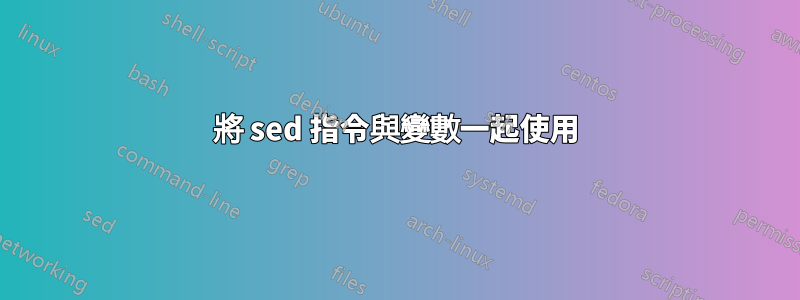
我已經嘗試了 Stack Overflow 及其相關網站上提供的所有可能的解決方案,但沒有找到任何解決方案。我在這個問題上花了相當多的時間,終於發布了這個問題。
我想將sed命令與 shell 變數一起使用。我的腳本非常簡單:
## string to replace is the text after comma in the variable pc.
to_replace=${pc#*,}
echo $to_replace
##text to be replaced by the following line
replace_with="PARTITIONED BY ($pc1);"
echo $replace_with
## use sed command to replace.
sed "s@$to_replace@$replace_with@" $entry ## $entry is the variable that contains the file name
這兩個echo命令分別給出以下輸出:
PARTITIONEDED BY (date_key ); ## the text I want to be replaced
PARTITIONED BY ( date_key int ); ## the text I want to replace with
我要么收到錯誤:
sed: -e expression #1, char 2: unterminated `s' command
或者文字根本沒有被替換。
請有人幫忙。我正在使用 Centos 6(如果有的話)。先致謝!
答案1
sed: -e expression #1, char 2: unterminated `s' command
錯誤訊息顯示錯誤發生在第二個字元上,這看起來很奇怪。我可以透過在第一個變數的開頭添加換行符來重現這一點:
$ a=$'\nfoo'
$ b='bar'
$ sed "s@$a@$b@"
sed: -e expression #1, char 2: unterminated `s' command
未轉義的換行符終止 sed 指令。當然,稍後放入換行符a會在後面的字元上產生錯誤。
您確實在腳本的前面列印了這兩個變量,但它們沒有被引用,因此它們中的任何前導空格都將被刪除,中間的空格將顯示為單個空格。
檢查變數實際包含的內容,如下所示:
printf ">%s<\n" "$to_replace"
printf "%q\n" "$to_replace"
後者是 Bash 功能,它以 Bash 接受作為輸入的方式顯示引用的字串。set -x也會顯示 sed 命令列的內容,但您需要注意其輸出中的文字換行符。
因此,如果只有一個前導換行符,您可以在腳本的開頭刪除它:
to_replace=${pc#*,}
to_replace=${to_replace#$'\n'}
(您可以將它們合併為一個,但即使換行符不存在,單獨的步驟也可以工作。)
答案2
嘗試這個
sed -i -e "s@$to_replace@$replace_with@g" "$entry"
在哪裡
-i意味著“就地”替換,如果不使用-i替換將在標準輸出上。


